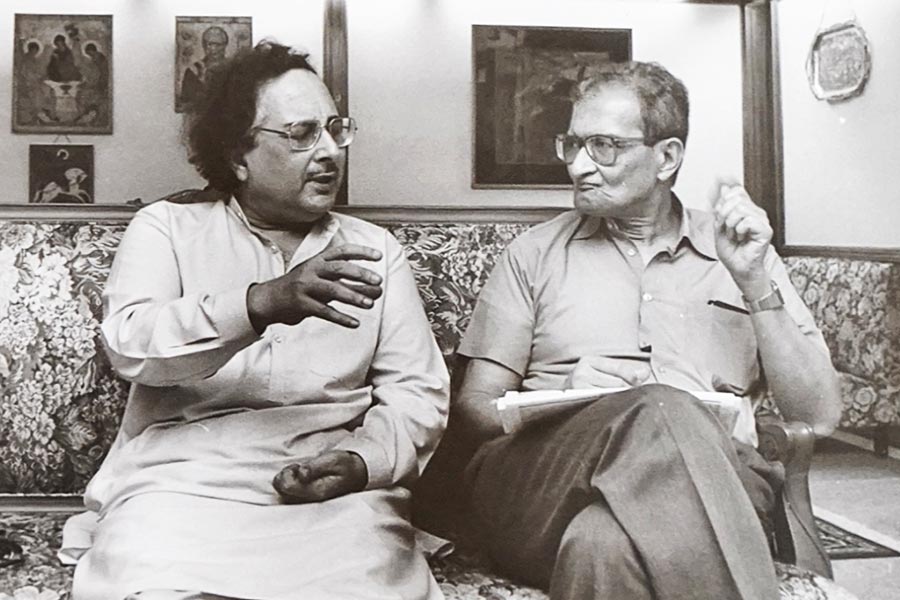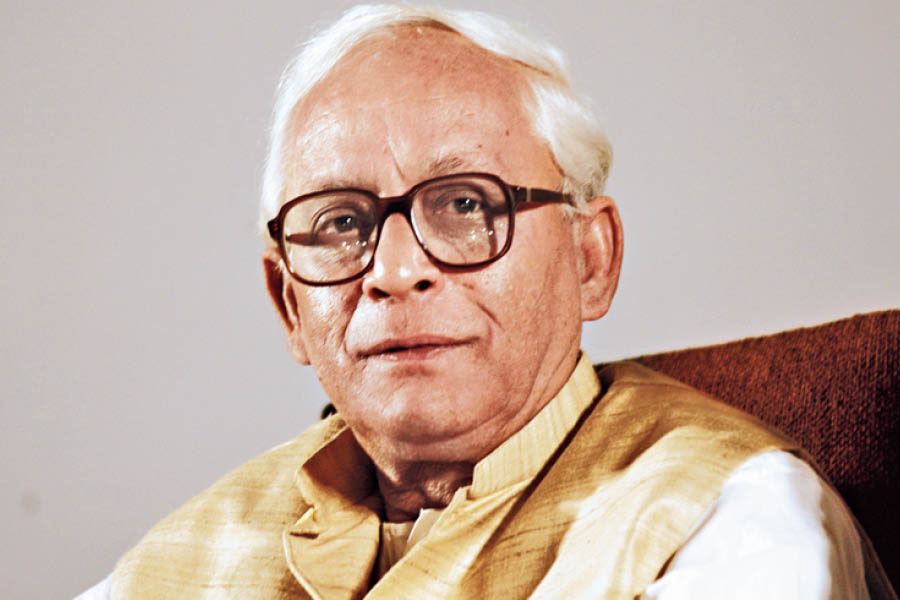Amiya Gooptu treated some of the world’s most accomplished statesmen to the fanciest drinks at his home bar, despite being a teetotaller himself. He strengthened India’s relationship with several countries over the course of multiple international missions, but caused a mini-crisis in Pakistan over some beef kebabs. An enigmatic man with an enigmatic story, who would have turned 91 on August 24.
The independent scion
The Gooptu family has had a prominent presence in Kolkata since the 18th century. In 1836, Dwarkanath Gooptu became one of the first three students from Asia to get a degree in Western medicine and went on to establish the hugely successful D. Gooptu & Co., the first dispensary of English medicines in India. His grandson, Fanindranath Gooptu, had the desire to create something Indian to back the Swadeshi Movement, and set up a pencil factory. Soon, F.N. Gooptu & Co. was the largest pen and pencil company in Asia.
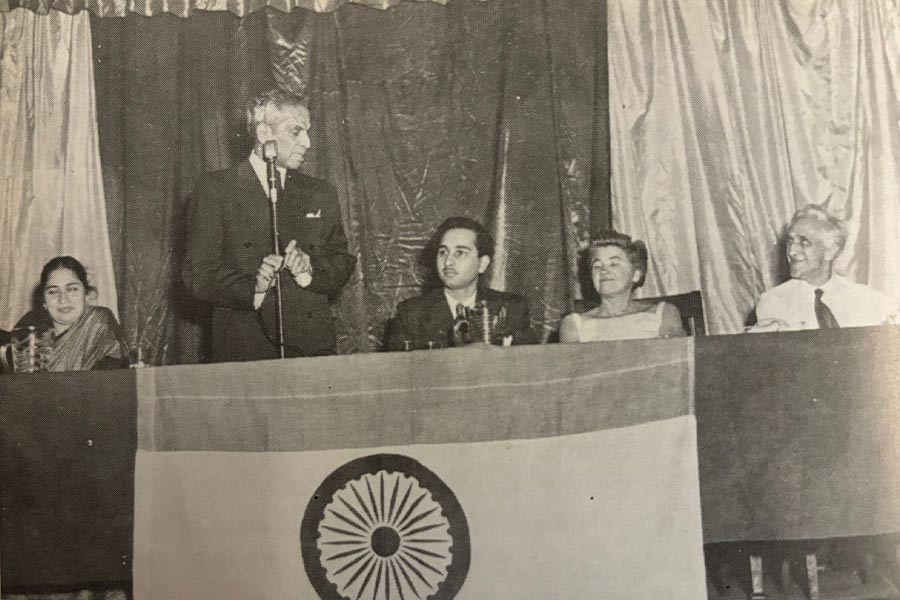
Amiya Gooptu, president of the London Majlis, at a reception for V.K. Krishna Menon, the then Union defence minister, at Conway Hall, Red Lion Square, 1958-59. Seated with him are Jennie Lee (Labour parliamentarian) and Kingsley Martin (editor of New Statesman)
Fanindranath’s grandson, Amiya, was born with the weight of this legacy in 1933. He was sent to Hare School, followed by St. Xavier’s College. “He became the president of the student council, and was very active in student politics. This was also the time when he found a love for theatre, winning awards for acting,” says his doting daughter Ayesha. Like most Gooptu men of the time, he was expected to either study medicine and join D. Gooptu, or study factory management and work at F.N. Gooptu. However, Amiya was never one to follow suit.
In his early teens, Amiya went to the London School of Economics and Political Science to study law. Like any other Bengali boy from Kolkata, idealism was second nature to him, and Amiya filled his academic diary not with class notes, but scribbles about his meetings and protests. Not long after, he was leading the London Majlis, a society of left-leaning immigrant students from around the world. As chance would have it, the Majlis had more than politics in store for him.
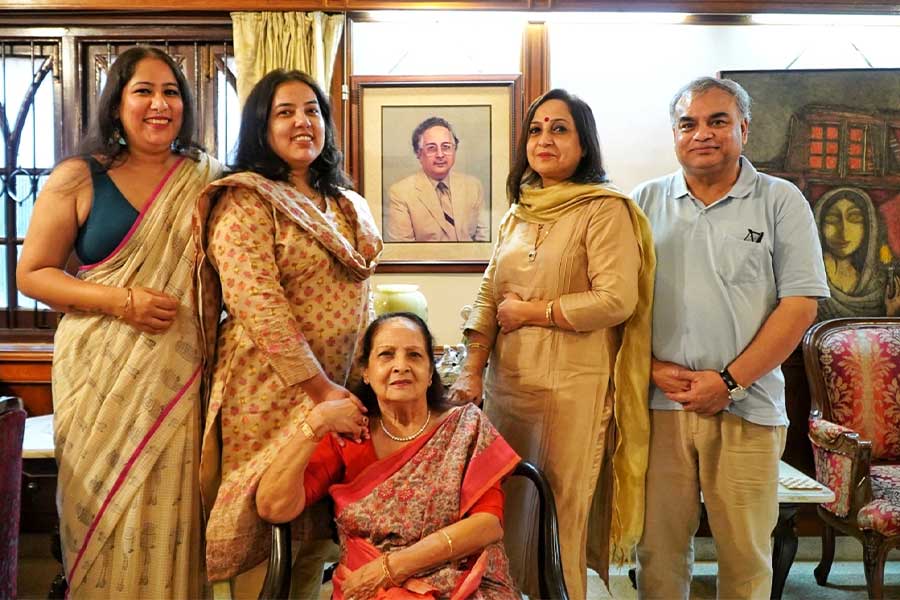
Amiya’s granddaughters (L-R) Nayantara and Sohini Mazumder, his wife, Aloka Gooptu, daughter Ayesha Gooptu, and nephew Pradeep Gooptu
Love in London
“Their love story started like a meet-cute from a movie! He saw my grandmother dancing at a Majlis event. For the better part of the next month, he waited for her to drop by the student council office at Trafalgar Square. When she finally did, he stood up, held out his hand and said, ‘Hi, my name is Amiya. I share the same name as your father, so you know what a good man I am!’” laughs his granddaughter, Nayantara.
Amiya sang, Aloka danced. Their love blossomed, one protest at a time. “They chained themselves to the railings of Whitehall when [Nelson] Mandela was jailed,” remembers Ayesha.
Amiya’s charms extended beyond romance. After a year in London, his university housing tenure was about to end. He was desperately looking for accommodation, having already faced more than 10 rejections owing to his Bengali name and accent. “One prospective landlady asked him over the phone if he was a fair Indian or a dark Indian. His daak naam was Melu, which can mean dark-skinned! But he was so desperate that he said, ‘Why don’t you meet me and decide if I qualify as fair?’ Needless to say, the landlady liked him so much that she agreed to take him as a tenant,” chuckles Nayantara.
After spending considerable time together, Amiya approached Aloka’s father to ask for her hand. His only condition — the wedding could happen only after she completed her education. “Despite it being an inter-caste love marriage in the 1950s, there was no family resistance. The only opposition came because they had already met each other,” jokes Amiya’s nephew, Pradeep.
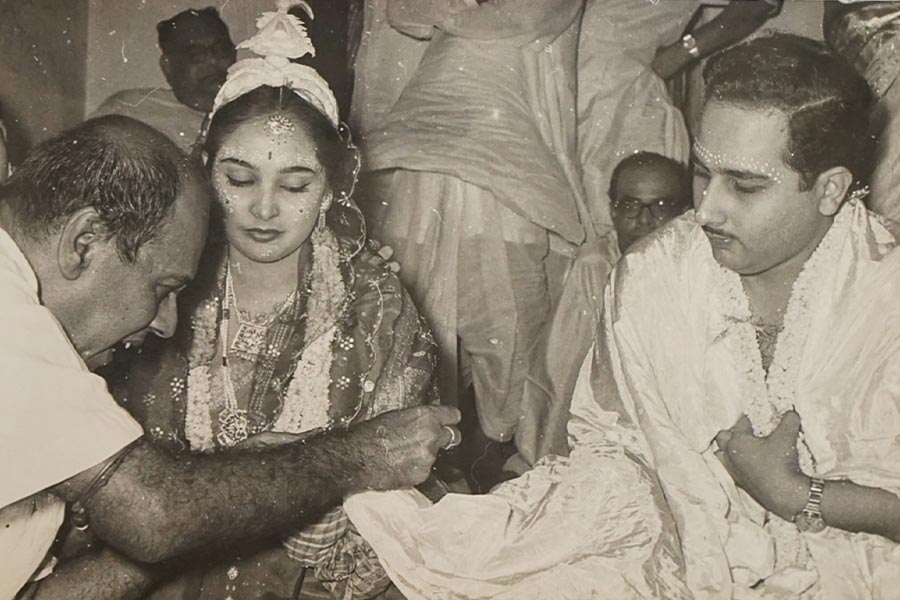
Aloka Bose and Amiya Gooptu at their wedding in Kolkata
Aloka was in for a huge surprise when she entered the Gooptu household. She expected it to be a small family, much like hers. What she didn’t expect was a vast joint family comprising five houses on Middleton Street, where hundreds of members were involved in everything. “The Gooptus are connected to nine generations of their ancestry, and everyone gathers for every important family function at our mandir in Jhamapukur. Our family home had more people than a London metro train!” Pradeep jokes. However, everyone took an instant liking to Aloka. “She was the first woman in our home to work after marriage, and taught at Rani Birla Girls’ College. Everyone was proud of her for being a career woman. In fact, my grandfather made it a point for her to be excused from fasting on festivals, since she would be tired after work,” smiles Sohini, Amiya’s other granddaughter. Sohini recently named both Amiya and Aloka in her PhD acknowledgement for inspiring her to be independent.
Handling the reins
Sadly, Amiya’s wings were clipped far too soon. His father fell seriously ill while he was still in London, prompting him to leave his law degree midway. As the eldest child, Amiya returned to Kolkata and took on the responsibility of both the family and the business. His individuality remained his most important asset. Instead of joining D. Gooptu or F.N. Gooptu, Amiya decided to do something independently. “He started not one, but three businesses. And all without taking a penny from his father,” beams Ayesha.
Amiya’s first venture was a tea export business, which became one of the largest to the Soviet Union. The second one was an agrochemical business. The third business handled investments. He also started making advertisement films. “He would export tea to Russia, which had chemicals suitable for India’s agricultural sector. He imported these chemicals and distributed them to the tea plantations here that were selling him tea,” marvels Pradeep, explaining how his uncle devised a symbiotic relationship between two of his ventures. In the decades that followed, each of these ventures became successful in their own right. But Amiya was never one to be satisfied.
The Bengal Initiative 2.0
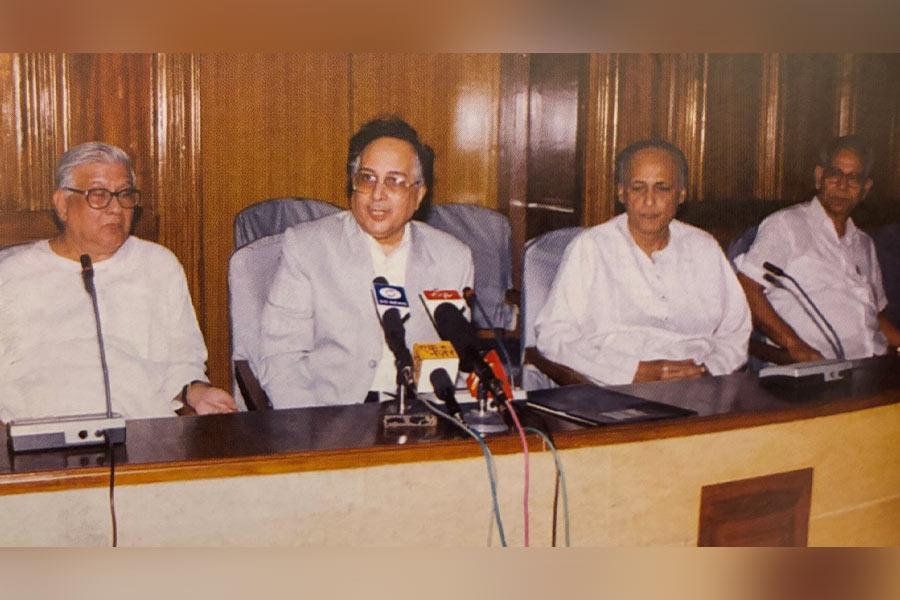
The release of Bengal Initiative’s report on higher education at the Bengal Assembly in August 2003. (L-R) then Parliamentarian Satyasadan Chakraborty, Amiya Gooptu, Hashim Abdul Halim (then Speaker at the Assembly) and then Rajya Sabha member Mohammed Amin
Amiya’s grandfather had started the Bengal Initiative (BI) in the early 1900s, enlisting eminent individuals from the city to brainstorm about the state’s welfare. In the 1980s, Bengal underwent another period of economic crisis, prompting Amiya to revive this institution. “He identified people who were willing to speak to the government on key issues like healthcare, justice, education and women’s rights. This Bengal Initiative wasn’t about making political criticisms, but a think tank providing constructive feedback to the government by drafting policies,” adds Pradeep, who was one of its key members as the then-editor of Business Standard. Its founding members included other influential Kolkatans like Apeejay Surrendra Group co-founder Jit Paul, Exide managing director S.B. Ganguly, and Tata Steel managing director Russi Mody.
The Bengal Initiative wasn’t just a meeting ground for people from different professions, but a confluence of communities. “He united everyone who had a stake in Kolkata’s wellbeing and wanted progressive agendas under BI and created a think tank,” says Pradeep. BI extended its boundaries from economics to culture, attracting thespians, musicians, artists and filmmakers, too. Prominent creative people like Goutam Ghose, Jogen Chowdhury, Paritosh Sen and Ganesh Pyne had stimulating debates at Amiya’s home on stage hegemony in cinema, the curriculum of institutes like the SRFTI and Government College of Art and Craft, trade unionism in art, and much more.
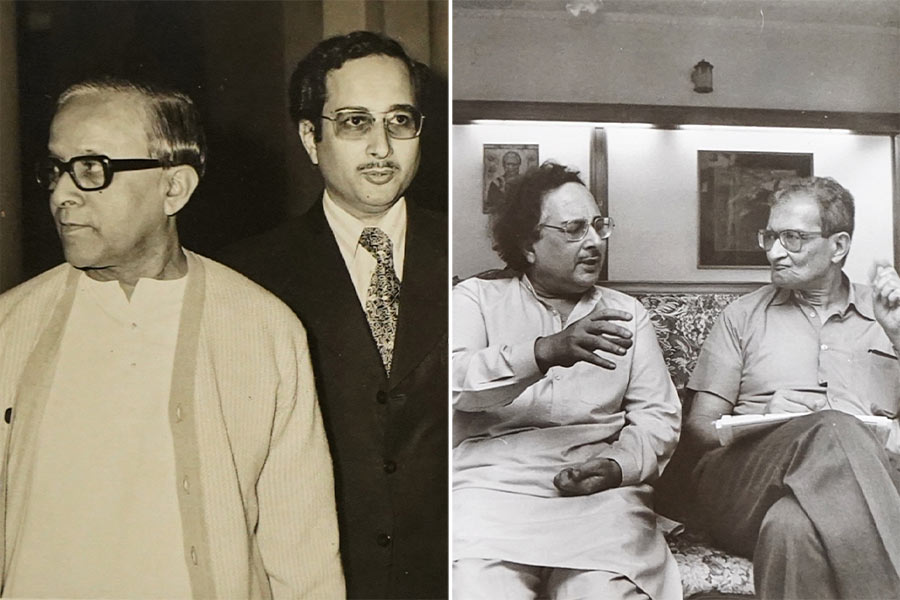
Amiya closely engaged with Jyoti Basu and Amartya Sen on several Bengal Initiative projects
One of BI’s most dedicated missions was to push for the re-introduction of English at the primary level in government schools. “We explained how seniors only learnt English to give exams, and eventually didn’t get selected in job interviews due to a lack of confidence. We faced a lot of opposition, but eventually succeeded,” Pradeep grins. BI fought a similar battle for computers. While the mere mention of computers would once lead to vandalism, they were eventually installed in government offices.
“My uncle always stood out in getting the best out of people. These were top professionals across fields and it took a lot of diplomacy to manage all the egos and interests to bring everyone together. He had no room for lobbying, and was committed to the inclusion of younger minds too,” Pradeep affectionately remembers. It is this collaborative ability that got Amiya selected as the Sheriff of Kolkata in 1982.
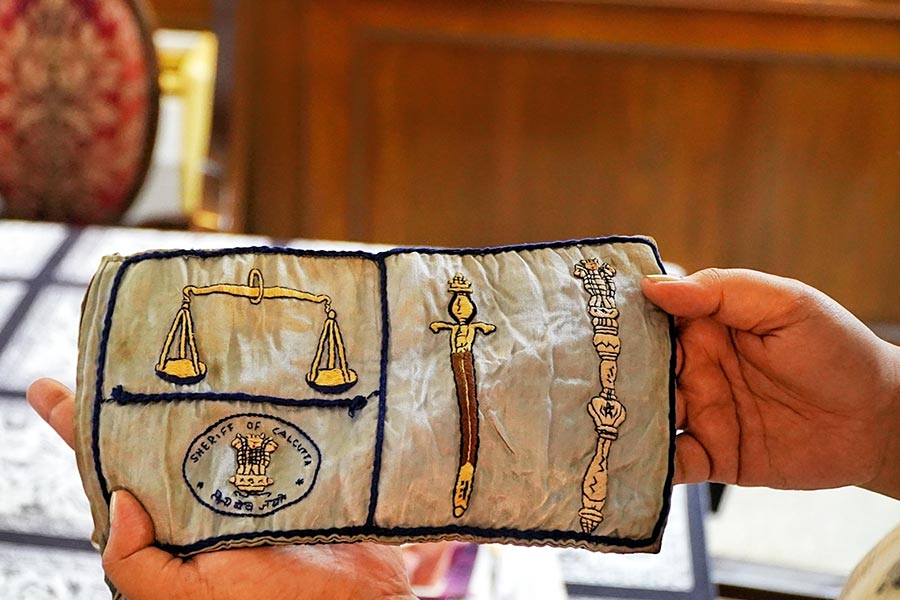
A memento commemorating Amiya Gooptu’s time as the Sheriff of Kolkata
Through BI, Amiya also undertook numerous missions to neighbouring countries to promote goodwill. His granddaughters remember pestering him after every mission to recount his experiences abroad. One particularly interesting ‘beef’ in Pakistan remains Nayantara’s favourite. “This was months before Kargil, and tensions were high. The entire trip had been planned to the T, and the Indian contingent had no time for themselves. One day, some of his colleagues decided to eat street food. My grandfather was overcome with the desire to try beef kebabs as he would never get this chance at home. However, the staff at the food stall didn’t comply, stating that the Indian embassy had given strict instructions to serve their contingent only vegetarian food. My grandfather lost it and caused a minor diplomatic crisis, saying, ‘I will not leave till I get my beef kebabs.’ Word got back to the embassy and it took a few hours, but he finally got his way!” This ‘appetite’ for diplomacy also led to Hungary recognising Amiya as their honorary consul general of eastern India.
‘He would oversee me cutting trees — that was our uncle-nephew relationship’
For Amiya, his neighbourhood was just as important as the country. One of the proudest achievements of his life was the cleanup of Allen Park, as president of the Rotary Club of Calcutta Midtown. Pradeep still remembers one morning in 1996, when his uncle strode into his office. “He came up to me and said, ‘Chol, parke gaach kata hochhe.’ He would oversee me cutting trees — that was our uncle-nephew relationship in a nutshell! Allen Park used to be a place where country liquor was distilled and drugs were sold. Today, it is where the Kolkata Christmas Festival is inaugurated.”
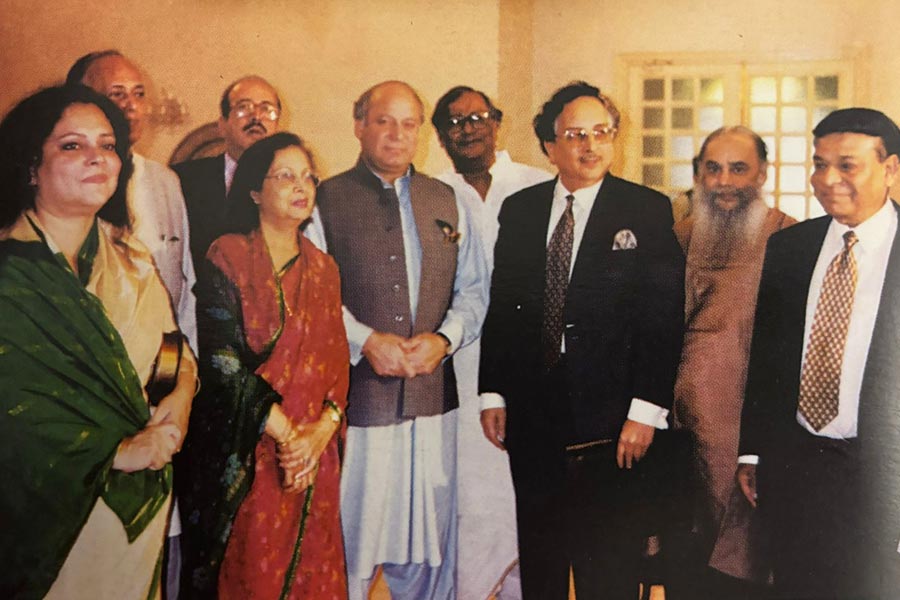
Amiya Gooptu, Hashim Abdul Halim, Suvaprasanna and other members of the first Bengal Initiative Goodwill Mission to Pakistan with the then-Prime Minister of Pakistan, Nawaz Sharif, in Islamabad (1999)
And yet, the Gooptus don’t remember Amiya solely for his legacy, but for the family man he was. Ayesha gushes over how he was often tasked with babysitting all the children, while Nayantara remembers how he separately allocated time to take them out for ice cream, and bought her most of her books. Pradeep chuckles that his business contacts would often receive Christmas cards from his uncle after one meeting. Ayesha’s voice breaks ever so slightly as she says, “With all his professional roles, I have no idea how he did it. He probably had 40 hours in a day.”
Never one to take a break, Amiya worked till the end. In 2006, hours before a BI meeting, Pradeep received a call, stating that his uncle had passed away. The book Amiya was reading remained open on his chest. Almost two decades on, Aloka holds on to the twinkle in her eye when she remembers him. “Ever since his passing, she (Aloka) reads his letters every night. His side of their bed is covered with his letters and photographs,” Ayesha signs off.
